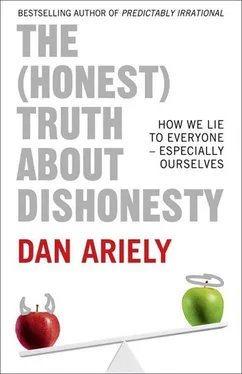Ariely, Dan - The (Honest) Truth About Dishonesty - How We Lie to Everyone – Especially Ourselves
Здесь есть возможность читать онлайн «Ariely, Dan - The (Honest) Truth About Dishonesty - How We Lie to Everyone – Especially Ourselves» весь текст электронной книги совершенно бесплатно (целиком полную версию без сокращений). В некоторых случаях можно слушать аудио, скачать через торрент в формате fb2 и присутствует краткое содержание. Жанр: Старинная литература, на английском языке. Описание произведения, (предисловие) а так же отзывы посетителей доступны на портале библиотеки ЛибКат.
- Название:The (Honest) Truth About Dishonesty: How We Lie to Everyone – Especially Ourselves
- Автор:
- Жанр:
- Год:неизвестен
- ISBN:нет данных
- Рейтинг книги:4 / 5. Голосов: 1
-
Избранное:Добавить в избранное
- Отзывы:
-
Ваша оценка:
- 80
- 1
- 2
- 3
- 4
- 5
The (Honest) Truth About Dishonesty: How We Lie to Everyone – Especially Ourselves: краткое содержание, описание и аннотация
Предлагаем к чтению аннотацию, описание, краткое содержание или предисловие (зависит от того, что написал сам автор книги «The (Honest) Truth About Dishonesty: How We Lie to Everyone – Especially Ourselves»). Если вы не нашли необходимую информацию о книге — напишите в комментариях, мы постараемся отыскать её.
The (Honest) Truth About Dishonesty: How We Lie to Everyone – Especially Ourselves — читать онлайн бесплатно полную книгу (весь текст) целиком
Ниже представлен текст книги, разбитый по страницам. Система сохранения места последней прочитанной страницы, позволяет с удобством читать онлайн бесплатно книгу «The (Honest) Truth About Dishonesty: How We Lie to Everyone – Especially Ourselves», без необходимости каждый раз заново искать на чём Вы остановились. Поставьте закладку, и сможете в любой момент перейти на страницу, на которой закончили чтение.
Интервал:
Закладка:
Though it is clearly important to try to reduce conflicts of interest, it is not easy to do so. Take contractors, lawyers, and car mechanics, for example. The way these professionals are paid puts them into terrible conflicts of interest because they both make the recommendation and benefit from the service, while the client has no expertise or leverage. But stop for a few minutes and try to think about a compensation model that would not involve any conflicts of interest. If you are taking the time to try to come up with such an approach, you most likely agree that it is very hard—if not impossible—to pull off. It is also important to realize that although conflicts of interest cause problems, they sometimes happen for good reason. Take the case of physicians (and dentists) ordering treatments that use equipment they own. Although this is a potentially dangerous practice from the perspective of conflicts of interest, it also has some built-in advantages: professionals are more likely to purchase equipment that they believe in; they are likely to become experts in using it; it can be much more convenient for the patient; and the doctors might even conduct some research that could help improve the equipment or the ways in which it is used.
The bottom line is that it is no easy task to come up with compensation systems that don’t inherently involve—and sometimes rely on—conflicts of interest. Even if we could eliminate all conflicts of interest, the cost of doing so in terms of decreased flexibility and increased bureaucracy and oversight might not be worth it—which is why we should not overzealously advocate draconian rules and restrictions (say, that physicians can never talk to pharma reps or own medical equipment). At the same time, I do think it’s important for us to realize the extent to which we can all be blinded by our financial motivations. We need to acknowledge that situations involving conflicts of interest have substantial disadvantages and attempt to thoughtfully reduce them when their costs are likely to outweigh their benefits.
As you might expect, there are many straightforward instances where conflicts of interest should simply be eliminated. For example, the conflicts for financial advisers who receive side payments, auditors who serve as consultants to the same firms, financial professionals who are paid handsome bonuses when their clients make money but lose nothing when their clients lose their shirts, rating agencies that are paid by the companies they rate, and politicians who accept money and favors from corporations and lobbyists in exchange for their votes; in all of these cases it seems to me that we must do our best to eradicate as many conflicts of interest as possible—most likely by regulation.
You’re probably skeptical that regulation of this sort could ever happen. When regulation by the government or by professional organizations does not materialize, we as consumers should recognize the danger that conflicts of interest bring with them and do our best to seek service providers who have fewer conflicts of interest (or, if possible, none). Through the power of our wallets we can push service providers to meet a demand for reduced conflicts of interest.
Finally, when we face serious decisions in which we realize that the person giving us advice may be biased—such as when a physician offers to tattoo our faces—we should spend just a little extra time and energy to seek a second opinion from a party that has no financial stake in the decision at hand.
CHAPTER 4
Why We Blow It When We’re Tired
Imagine yourself at the end of a really long, hard day. Let’s say it’s the most exhausting of days: moving day. You’re completely exhausted. Even your hair feels tired. Cooking is certainly out of the question. You don’t even have the energy to locate a pan, plate, and fork, much less put them to use. Clearly it’s going to be a take-out night.
Within a block of your new place are three restaurants. One is a little bistro with fresh salads and paninis. Another is a Chinese place; the greasy, salty smells emanating from within make the back of your mouth tingle. There’s also a cute mom-and-pop pizzeria where the locals enjoy cheesy slices twice the size of their faces. To which restaurant do you drag your tired, aching body? Which kind of cuisine would you prefer to enjoy on your new floor? By contrast, consider what your choice might be if the meal were after an afternoon spent relaxing in the backyard with a good book.
In case you haven’t noticed, on stressful days many of us give in to temptation and choose one of the less healthy alternatives. Chinese takeout and pizza are practically synonymous with moving day, conjuring up an image of a young, attractive, tired, but happy couple surrounded by cardboard boxes and eating chow mein out of the box with chopsticks. And we all remember the times college friends offered us pizza and beer in exchange for helping them move.
This mysterious connection between exhaustion and the consumption of junk food is not just a figment of your imagination. And it is the reason why so many diets die on the chopping block of stress and why people start smoking again after a crisis.
Let Us Eat Cake
The key to this mystery has to do with the struggle between the impulsive (or emotional) and the rational (or deliberative) parts of ourselves. This is not a new idea; many seminal books (and academic papers) throughout history have had something to say about the conflicts between desire and reason. We have Adam and Eve, tempted by the prospect of forbidden knowledge and that succulent fruit. There was Odysseus, who knew he’d be lured by the Sirens’ song and cleverly ordered his crew to tie him to the mast and fill their ears with wax to muffle the tantalizing call (that way, Odysseus could have it both ways—he could hear the song without worrying that the men would wreck the ship). And in one of the most tragic struggles between emotion and reason, Shakespeare’s Romeo and Juliet fell hard for each other, despite Friar Laurence’s warning that untamed passion only brings disaster.
In a fascinating demonstration of the tension between reason and desire, Baba Shiv (a professor at Stanford University) and Sasha Fedorikhin (a professor at Indiana University) examined the idea that people fall into temptation more frequently when the part of their brain that is in charge of deliberative thinking is otherwise occupied. To reduce participants’ ability to think effectively, Baba and Sasha did not remove parts of their brains (as animal researchers sometimes do), nor did they use magnetic pulses to disrupt thinking (though there are machines that can do that). Instead, they decided to tax their participants’ ability to think by piling on what psychologists call cognitive load. Simply put, they wanted to find out whether having a lot on one’s mind would leave less cognitive room for resisting temptation and make people more likely to succumb to it.
Baba and Sasha’s experiment went like this: they divided participants into two groups and asked members of one group to remember a two-digit number (something like, say, 35) and they asked members of the other group to remember a seven-digit number (say, 7581280). The participants were told that in order to get their payment for the experiment, they would have to repeat the number to another experimenter who was waiting for them in a second room at the other end of the corridor. And if they didn’t remember the number? No reward.
The participants lined up to take part in the experiment and were briefly shown either the two-digit number or the seven-digit number. With their numbers in mind, they each walked down the hall to the second room where they would be asked to recall the number. But on the way, they unexpectedly passed by a cart displaying pieces of rich, dark chocolate cake and bowls of colorful, healthy-looking fruit. As participants passed the cart, another experimenter told them that once they got to the second room and recited their number they could have one of the two snacks—but they had to make their decision right then, at the cart. The participants made their choice, received a slip of paper indicating their chosen snack, and off they went to the second room.
Читать дальшеИнтервал:
Закладка:
Похожие книги на «The (Honest) Truth About Dishonesty: How We Lie to Everyone – Especially Ourselves»
Представляем Вашему вниманию похожие книги на «The (Honest) Truth About Dishonesty: How We Lie to Everyone – Especially Ourselves» списком для выбора. Мы отобрали схожую по названию и смыслу литературу в надежде предоставить читателям больше вариантов отыскать новые, интересные, ещё непрочитанные произведения.
Обсуждение, отзывы о книге «The (Honest) Truth About Dishonesty: How We Lie to Everyone – Especially Ourselves» и просто собственные мнения читателей. Оставьте ваши комментарии, напишите, что Вы думаете о произведении, его смысле или главных героях. Укажите что конкретно понравилось, а что нет, и почему Вы так считаете.












